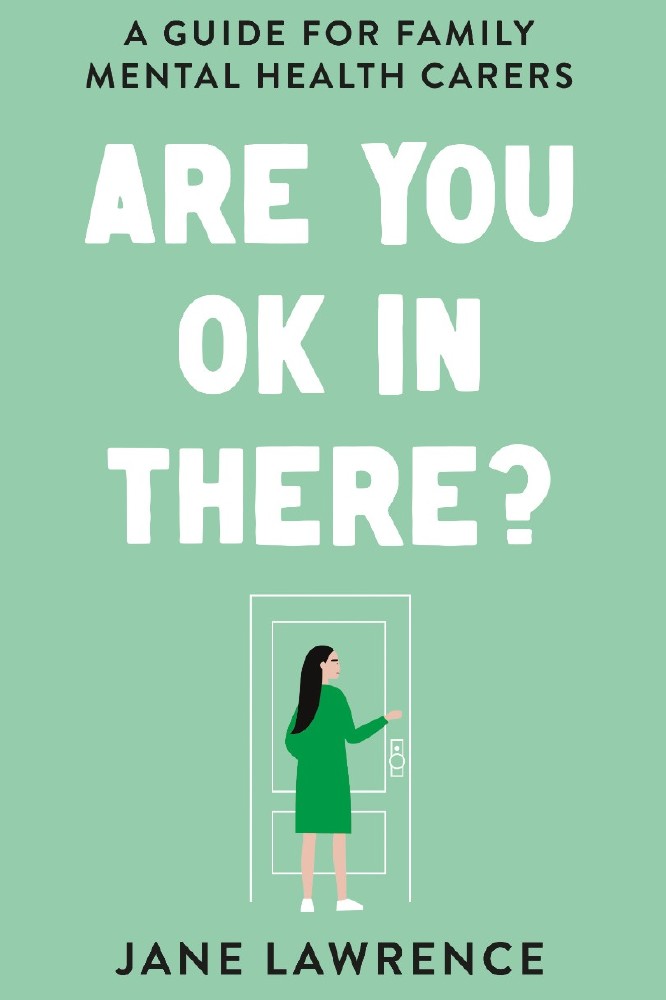Working for many years in mental health services I talked to countless people going through all kinds of devastating experiences. Their lives had been derailed by the more severe and enduring mental health conditions, the ones that don’t get talked about so much. Currently there is widespread media coverage of mental health issues, which is wonderful, but mostly this concerns the effects of anxiety and depression. Both are major challenges, of course they are, especially in their most extreme forms, but there are other diagnoses such as bi-polar affective disorder, personality disorders and psychotic conditions such as schizophrenia that affect people differently. These can engulf the individual totally, at least for a while.

Are You Ok In There?
Self- help with mental health issues is crucial and never easy in any situation, but with these harsher symptoms often professional intervention and medication is a necessary part of recovery.
I never thought about what life was like for family members who were trying to keep this person safe and well at home. Nearly 20 years ago I went for a job with carer support, although I confess I knew little about it then. It was a real shock to realise what these families and partners were coping with, from the first frightening stages when no one knows what is happening, through worrying crises and the struggle to manage day to day life and to get help.
These family carers have to watch a person that they care deeply about change and become a stranger. There may be alarming incidents involving self-harm, risky behaviour or suicide attempts. Having someone in the house who says they want to kill themselves is unimaginably stressful especially if that someone is a person you love. Help may seem long time coming and any hospital admission often involves the distressing process of a Mental Health Act ‘section’. It is the family who need to hold things together for most of the time.
RELATED: Time for change in relation to men’s mental health issues
Watching your relative or partner becoming highly agitated or impossible to ‘reach’ has considerable emotional impact on family members. Like a bereavement, the person is ‘lost’ for a time and the future that was planned may have to be adapted to the new circumstances. Additionally in mental health there is the guilt that many carers carry, particularly parents, because there is a feeling of either having caused or at least not prevented this thing from happening - although this is seldom the case.
It is also ‘normal’ to become angry and frustrated with the person who may appear not to be helping themselves at all, who may be reluctant to cooperate with any offered support but who cannot be proved to be ‘ill’ by an X ray, a blood test or similar. Family carers often feel guilty and alone in feeling this way until they share these ideas and discover how it is part of the ‘carer package’.
Carers are also notoriously bad at self-care because they prioritise other people’s welfare. It is easy to say that there is ‘no time’ or that they are just too tired and worried to relax.
My new book gathers the hints, hacks and inspirations that I learnt from carers in order that this information would be widely available to the many others coping with these demanding situations. There seems to be so little information available that is written for families rather than professionals or for the person with the mental health condition themselves. Like most of us these carers probably had little prior knowledge about mental health until it suddenly became crucial to know more. Usually this would mean frantically seeking scattered internet advice or friends’ opinions.
I worked with some courageous and resilient people, they hung on and often sacrificed their own well-being to help this other person. They should get more support than they do, the mental health services are often too busy or not able to talk to them privately. Carer support workers and groups that focus on mental ill health are less available these days too.
Without these families the cost of mental health care would increase significantly, but they need support and information to do what they do. I am hoping my book can play a small part in this.
Are You OK In There? is available to buy from bookguild.co.uk and all good bookshops.
RELATED: Seven ways crafting can benefit your mental health this Christmas
As the nation continues to face uncertainty with local lockdowns, restrictions and social distancing, the impact on our mental health and wellbeing, especially for those of us with existing mental health problems, is unquestionable. Mind recently surveyed thousands of adults over age 25 in England and Wales. We found that two out of three adults with existing mental health problems reported worse mental health as a result of the coronavirus pandemic. Many people have turned to crafting as a means of coping, here are five reasons why it’s so beneficial to your mental health... to read more click HERE

Tagged in Mental Health

